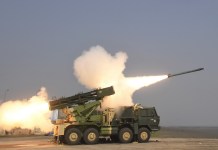Lance Naik Mangal Singh, a 26-year-old Indian Army soldier who was taken as a war prisoner during the 1971 war, is still languishing in jail in Pakistan. Almost 50 years later, his family has come to know about his whereabouts, a development that may ignite hopes in scores of others who have suffered similar ordeals.
Watch: Azerbaijan Humiliates Armenia By Displaying ‘Spoils Of War’ During Its Victory Parade
India won the war against Pakistan because of the sheer valor and sacrifices of its armed forces and helped liberate Bangladesh, then called East Pakistan.
However, following the war, both sides captured thousands of war prisoners. The governments from India and Pakistan repatriated soldiers following the 1972 Simla Agreement. India sent back about 93,000 Pakistani soldiers and Pakistan repatriated about 600 Indian soldiers.
On Vijay Diwas, let us recall the valour of our soldiers that affirmed our nation’s unwavering commitment to defend our sovereignty and protect human dignity. Their martyrdom in 1971 war had shown unparalleled grit & prowess of our forces. The nation is eternally indebted to them
— President of India (@rashtrapatibhvn) December 16, 2020
One such soldier captured by Pakistan was Lance Naik Mangal Singh. Now, almost 50 years later, his wife and two sons still await to see him. Satya Devi, Singh’s 75-year-old wife from India’s Jalandhar city, earlier this month received the good news she was long waiting for. A letter from the President of India informed her about Singh’s whereabouts.
The letter dated December 2, 2020, said that Singh’s name is included in the list of 83 missing defense personnel who are believed to be in Pakistan’s custody. “The name of Lance Naik Mangal Singh is one among the 83 defense personnel in its custody.
The government remains seized of the matter and continues to pursue this matter with the government of Pakistan,” the letter accessed by India Today read.

Singh was recruited in the Indian Army in 1962 and was posted in Ranchi at the time. In 1971, he was transferred to Kolkata, West Bengal. He was posted on the frontline during the war. A few days later, Satya Devi received a letter informing that a boat carrying Indian soldiers, including Singh, capsized and leaving no survivors.
Singh’s two sons were three and one-year-old when the news of his death arrived. However, a year later, the family was pleasantly surprised when Singh appeared on Rawalpindi radio and announced that he was alive, said India Today reported. He also said that he was a family man and had two sons named Daljeet Singh and Baljinder Singh, added the report.
सच पूछो, तो शर में ही
बसती है दीप्ति विनय की,
सन्धि-वचन संपूज्य उसी का जिसमें शक्ति विजय की।#IndianArmy#AlwaysVictorious#PakSurrenderDay pic.twitter.com/8MYDFitcRf— ADG PI – INDIAN ARMY (@adgpi) December 16, 2020
Last year, India’s Ministry of External Affairs notified the parliament that 83 missing Indian defense personnel, including prisoners of war, are believed to be in Pakistan’s custody. The government has consistently taken up the matter of release and repatriation of these missing Indian defense personnel with Pakistan through diplomatic channels.
However, Pakistan has not acknowledged the presence of any Indian Prisoner of War/missing Indian defense personnel in its custody, so far, the MEA said.
Pakistan On Denial Mode
Avtar Singh Bhasin, former Director of the Historical Divison of the Ministry of External Affairs speaking to EurAsian Times said that this is a regular issue with the Pakistani government that they refuse to acknowledge these prisoners. He added that there have been numerous cases in the past when the Pakistani authorities refused to acknowledge the Indian soldiers in their jails.
He further explained that if Pakistan recognizes their presence, then under Geneva Conventions, they cannot keep a prisoner of war indefinitely in custody.
Earlier, President of All India Veteran Core Group, Brigadier H S Ghuman (retd) criticized the government for being “benevolent” for returning 93,000 prisoners of war without ensuring a safe return of the Indian soldiers. He blamed the “poor representation of Army officials in the Ministry of Defense”.
Bhasin pointed out that the repatriation of soldiers was a part of the Simla Agreement signed between then-Prime Minister Indira Gandhi and Pakistan President Zulfikar Ali Bhutto in 1972. It was a peace treaty seeking to reverse the consequences of the 1971 war, to bring about withdrawals of troops and an exchange of prisoners of war.
“Those Pakistani war prisoners also become a burden on the government of India concerning financial, security, and health angle. There was also an added pressure from the international community to release the prisoners as the Geneva Conventions dictate,” Bhasin said.
He emphasized that it wasn’t about being “benevolent” but maintaining the health and security of 93000 prisoners was a burden on India. “How can you look after 93,000 people, feed them, look after their security and health and other basic needs? It was a big expenditure for India at the time.”
While Mangal Singh, like many others, is still languishing in Pakistani jails, it is yet to be seen how the Indian government moves forward to bring them back and reunite them with their families.
Follow EurAsian Times on Google News




